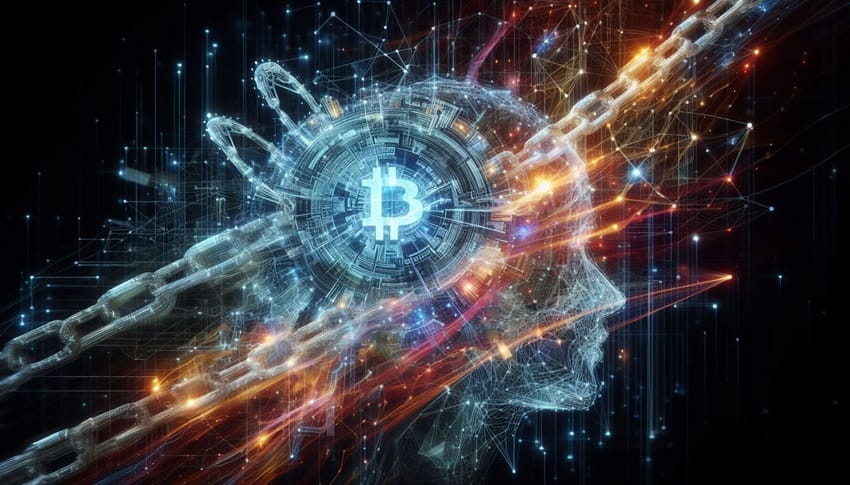Blockchain Technology Gets A Throttle with AI
Blockchain technology has transformed the landscape of digital transactions, offering decentralized and secure ways to conduct business. However, the integration of artificial intelligence (AI) with blockchain is revolutionizing this landscape even further. This article explores the intersection of AI and blockchain, delving into their symbiotic relationship, applications, challenges, and future prospects.
Understanding Blockchain Technology
Blockchain is a distributed ledger technology that records transactions across multiple computers in a way that is secure, transparent, and tamper-proof. Each block contains a cryptographic hash of the previous block, creating a chain of blocks, hence the name “blockchain.”
Transactions are verified by network participants through consensus mechanisms like proof of work or proof of stake. Once verified, transactions are grouped into blocks and added to the blockchain in a linear, chronological order. This decentralized structure ensures immutability and transparency.
The Role of AI in Enhancing Blockchain Technology
AI complements blockchain technology by providing advanced capabilities that enhance its efficiency, security, and scalability.
Streamlining Transactions
AI algorithms can optimize transaction processing by predicting network congestion, optimizing gas fees, and improving transaction speeds. This streamlining of transactions enhances the overall user experience and lowers operational costs.
Improving Security
AI-powered security protocols can detect and prevent fraudulent activities within blockchain networks. Machine learning algorithms analyze transaction patterns to identify anomalies and potential threats, thus fortifying the security infrastructure of blockchain platforms.
Enhancing Scalability
Scalability has been a challenge for blockchain networks, especially in handling a large volume of transactions. AI-driven solutions, such as sharding and off-chain processing, can enhance scalability by distributing computational tasks efficiently across the network.
Applications of AI in Blockchain
The integration of AI and blockchain opens up a myriad of applications across various industries.
Smart Contracts
AI-enabled smart contracts can execute predefined actions based on real-time data inputs, automating complex agreements without the need for intermediaries. This streamlines processes in sectors like insurance, real estate, and finance.
Supply Chain Management
AI-powered blockchain solutions enhance supply chain transparency and traceability by tracking the movement of goods and verifying product authenticity. This improves efficiency, reduces counterfeiting, and ensures compliance with regulatory standards.
Identity Verification
AI algorithms can enhance identity verification processes on blockchain networks by analyzing biometric data, behavioral patterns, and historical records. This strengthens security measures and mitigates identity theft risks.
Decentralized Finance (DeFi)
AI-powered analytics in DeFi platforms can assess risk factors, predict market trends, and optimize investment strategies. This empowers users with data-driven insights and facilitates more informed financial decisions.

Challenges and Limitations
Despite its potential, the integration of AI and blockchain faces several challenges and limitations.
Data Privacy and Security Concerns
The use of AI in blockchain raises concerns regarding data privacy and security, especially regarding the confidentiality of sensitive information stored on decentralized networks.
Regulatory Hurdles
The regulatory landscape surrounding AI and blockchain is still evolving, posing compliance challenges for businesses operating in this space. Clear guidelines and standards are needed to address legal and regulatory uncertainties.
Integration Issues
Integrating AI algorithms with existing blockchain networks requires careful planning and technical expertise. Compatibility issues and interoperability concerns may arise during the implementation phase.
Future Prospects and Trends
Despite the challenges, the future of AI in blockchain looks promising. Innovations in AI-driven consensus mechanisms, privacy-preserving technologies, and interoperable blockchain networks are expected to drive further adoption and innovation in this space.
In conclusion, the integration of AI and blockchain represents a significant milestone in the evolution of decentralized technology. By harnessing the power of AI, blockchain platforms can achieve greater efficiency, security, and scalability, paving the way for transformative applications across various industries.
FAQs
- Is AI necessary for blockchain technology?
- While not necessary, AI enhances the capabilities of blockchain, improving efficiency, security, and scalability.
- What are some real-world examples of AI in blockchain?
- Examples include AI-powered smart contracts, supply chain management solutions, and identity verification platforms.
- What challenges does the integration of AI and blockchain face?
- Challenges include data privacy concerns, regulatory hurdles, and integration issues.
- How can businesses benefit from AI in blockchain?
- Businesses can benefit from enhanced security, streamlined processes, and data-driven insights offered by AI-powered blockchain solutions.
- What does the future hold for AI in blockchain technology?
- The future holds promise for innovations in AI-driven consensus mechanisms, privacy-preserving technologies, and interoperable blockchain networks.
Stay informed with daily updates from Blockchain Magazine on Google News. Click here to follow us and mark as favorite: [Blockchain Magazine on Google News].
Get Blockchain Insights In Inbox
Stay ahead of the curve with expert analysis and market updates.
latest from tech
Disclaimer: Any post shared by a third-party agency are sponsored and Blockchain Magazine has no views on any such posts. The views and opinions expressed in this post are those of the clients and do not necessarily reflect the official policy or position of Blockchain Magazine. The information provided in this post is for informational purposes only and should not be considered as financial, investment, or professional advice. Blockchain Magazine does not endorse or promote any specific products, services, or companies mentioned in this posts. Readers are encouraged to conduct their own research and consult with a qualified professional before making any financial decisions. The featured image used is just a creative depiction of the title and it does not intend to hurt sentiments of any person or institution. If it hurts anyone sentiments, please do not hesitate to reach out to Blockchain Magazine.

 Bitcoin
Bitcoin  Ethereum
Ethereum  XRP
XRP  Tether
Tether  Solana
Solana  USDC
USDC  Dogecoin
Dogecoin  Cardano
Cardano  Lido Staked Ether
Lido Staked Ether  TRON
TRON  Chainlink
Chainlink  Avalanche
Avalanche  Wrapped Bitcoin
Wrapped Bitcoin  Wrapped stETH
Wrapped stETH  Stellar
Stellar  Toncoin
Toncoin  Hedera
Hedera  Sui
Sui  Shiba Inu
Shiba Inu  WETH
WETH  LEO Token
LEO Token  Polkadot
Polkadot  Litecoin
Litecoin  Bitget Token
Bitget Token  Bitcoin Cash
Bitcoin Cash  Hyperliquid
Hyperliquid  USDS
USDS  Uniswap
Uniswap  Wrapped eETH
Wrapped eETH  Ethena USDe
Ethena USDe  Official Trump
Official Trump  NEAR Protocol
NEAR Protocol  Pepe
Pepe  MANTRA
MANTRA  Aave
Aave  Ondo
Ondo  Aptos
Aptos  Internet Computer
Internet Computer  WhiteBIT Coin
WhiteBIT Coin  Monero
Monero  Ethereum Classic
Ethereum Classic  Bittensor
Bittensor  Mantle
Mantle  Dai
Dai  Cronos
Cronos  POL (ex-MATIC)
POL (ex-MATIC)  OKB
OKB 




